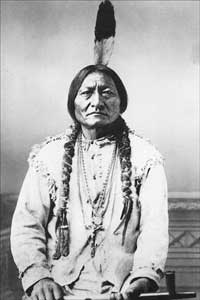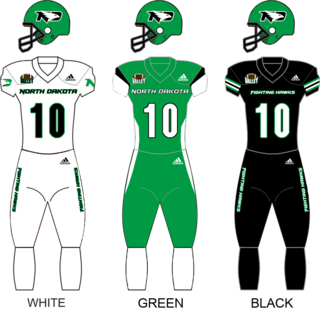External links
- "Fight On Sioux" - und.edu
| Venues |
|
|---|---|
| Bowls & rivalries |
|
| Culture & lore | |
| People | |
| Seasons |
|
National championship seasons in bold | |
| | This North Dakota–related article is a stub. You can help Wikipedia by expanding it. |
"Fight On Sioux" is a fight song of the University of North Dakota in Grand Forks, North Dakota. [1] Since the retiring of the Fighting Sioux nickname in 2012, it has been renamed to "U-N-D". Along with the new name, any references to Native American culture have been removed. For example, in the old version, one line stated "And as we go we'll show each foe that we're the toughest tribe between the poles". In the new version of the song, the word "tribe" has been replaced with the word "team".
Fight on Sioux, we're all for you
We're thousands of strong and loyal souls
We know you'll win every game you're in
No matter how distant the goals
As we go, we'll show each foe that
We're the toughest tribe between the poles
We're rough and tough it's true
But we're sportsmen through and through
We're the Fighting Sioux from North Dakota U

The Sioux or Oceti Sakowin are groups of Native American tribes and First Nations people from the Great Plains of North America. The Sioux have two major linguistic divisions: the Dakota and Lakota peoples. Collectively, they are the Očhéthi Šakówiŋ, or "Seven Council Fires". The term "Sioux", an exonym from a French transcription of the Ojibwe term Nadowessi, can refer to any ethnic group within the Great Sioux Nation or to any of the nation's many language dialects.

Sitting Bull was a Hunkpapa Lakota leader who led his people during years of resistance against United States government policies. Sitting Bull was killed by Indian agency police on the Standing Rock Indian Reservation during an attempt to arrest him at a time when authorities feared that he would join the Ghost Dance movement.

Lakota, also referred to as Lakhota, Teton or Teton Sioux, is a Siouan language spoken by the Lakota people of the Sioux tribes. Lakota is mutually intelligible with the two dialects of the Dakota language, especially Western Dakota, and is one of the three major varieties of the Sioux language.

The Arikara, also known as Sahnish, Arikaree, Ree, or Hundi, are a tribe of Native Americans in North Dakota. Today, they are enrolled with the Mandan and the Hidatsa as the federally recognized tribe known as the Mandan, Hidatsa, and Arikara Nation.

Ralph Engelstad Arena (REA), commonly called the Ralph, is an indoor arena located on the campus of the University of North Dakota (UND) in Grand Forks, North Dakota and serves as the home of UND men's ice hockey. The arena was built by controversial UND alumnus Ralph Engelstad. The North Dakota Fighting Hawks men's hockey team is the tenant. The arena formerly hosted the defunct North Dakota women's hockey team.
The Dakota language, also referred to as Dakhóta, is a Siouan language spoken by the Dakota people of the Očhéthi Šakówiŋ, commonly known in English as the Sioux. Dakota is closely related to and mutually intelligible with the Lakota language. It is definitely endangered, with only around 290 fluent speakers left out of an ethnic population of almost 250,000.
Sioux is a Siouan language spoken by over 30,000 Sioux in the United States and Canada, making it the fifth most spoken Indigenous language in the United States or Canada, behind Navajo, Cree, Inuit languages, and Ojibwe.
Nakota is the endonym used by those Native peoples of North America who usually go by the name of Assiniboine, in the United States, and of Stoney, in Canada.
"The Army Goes Rolling Along" is the official song of the United States Army and is typically called "The Army Song". It is adapted from an earlier work from 1908 entitled "The Caissons Go Rolling Along", which was in turn incorporated into John Philip Sousa's "U.S. Field Artillery March" in 1917.

The North Dakota Fighting Hawks represent the University of North Dakota, competing as a member of the Missouri Valley Football Conference (MVFC) in the NCAA Division I's Football Championship Subdivision. From 1973 to 2008, they played in the NCAA's NCAA Division II, winning the national championship in 2001. From 1955 to 1972, they competed in the NCAA's College Division where they participated in and won three bowl games.

"Hail to Old OSU" is the fight song of Oregon State University. It is extracted from a song written by Harold A. Wilkins in 1914 and is played mainly at sporting events like football and basketball games. The lyrics have been slightly altered since being written "to conform to a changing culture", changing to conform to new initials, and the use of a more gender-neutral version.
"Fight On, State" is the official fight song of The Pennsylvania State University. It is most widely known for being played by the Penn State Blue Band after scores at football games, and during the band's pregame show. It is written specifically to be played after a touchdown, as it slows down quickly toward the end of the song, then stops. It then resumes after the team kicks an extra point and is played again at regular speed.
"Jarama Valley" also known as "El Valle del Jarama" is a song from the Second Spanish Republic. Referring to the Spanish Civil War Battle of Jarama, the song uses the tune of Red River Valley.
The history of South Dakota describes the history of the U.S. state of South Dakota over the course of several millennia, from its first inhabitants to the recent issues facing the state.

"Hail to Pitt" is the most traditional fight song of the University of Pittsburgh, which is commonly referred to as Pitt. The saying "Hail to Pitt!" is also the most traditional and commonly used slogan of the University of Pittsburgh and its athletics teams. The slogan is frequently used in promotional material, printed on merchandise and souvenirs. It was also the title of a 1982 history of Pitt athletics by author Jim O'Brien. The slogan is often used among alumni as a statement of affiliation, including as a closing signature in conversation or correspondence between alumni, and is sometime abbreviated as "HTP" or "H2P", the latter of which is a registered trademark of the university and is frequently used on official university signage and merchandise.

Wabasha II, also known as Wapahasha, Wapasha, or "The Leaf," succeeded his father as head chief of the Mdewakanton Dakota tribe in the early 1800s. He led the Dakota forces fighting with the British in the War of 1812, but sided with the United States in the Black Hawk War of 1832. Chief Wabasha II signed the Treaties of Prairie du Chien in 1825 and 1830.

"The Bold Canadian" was a patriotic song for Canadians that originated during the War of 1812. It celebrated the conquering of Detroit in Michigan Territory.

The North Dakota Fighting Sioux controversy refers to the controversy surrounding the now retired nickname and logo of the North Dakota Fighting Hawks a member of the National Collegiate Athletic Association (NCAA), the athletic teams that represented the University of North Dakota (UND) based in Grand Forks, North Dakota.

The Dakota Access Pipeline Protests or the Standing Rock Protests, also known by the hashtag #NoDAPL, were a series of grassroots Native American protests against the construction of the Dakota Access Pipeline in the northern United States that began in April 2016. Protests ended on February 23, 2017 when National Guard and law enforcement officers evicted the last remaining protesters.

The Minnesota–North Dakota ice hockey rivalry is an intercollegiate ice hockey rivalry between the Minnesota Golden Gophers and North Dakota Fighting Hawks. The rivalry is between two of the most successful programs in the sport, as the teams have combined for 13 national titles and 45 Frozen Four appearances in the NCAA tournament. Minnesota has met North Dakota five times in the national tournament, holding a narrow 3–2 advantage. The teams have played 298 official games through the 2023-24 season, with Minnesota leading 145–137–16.